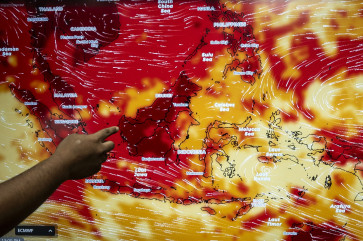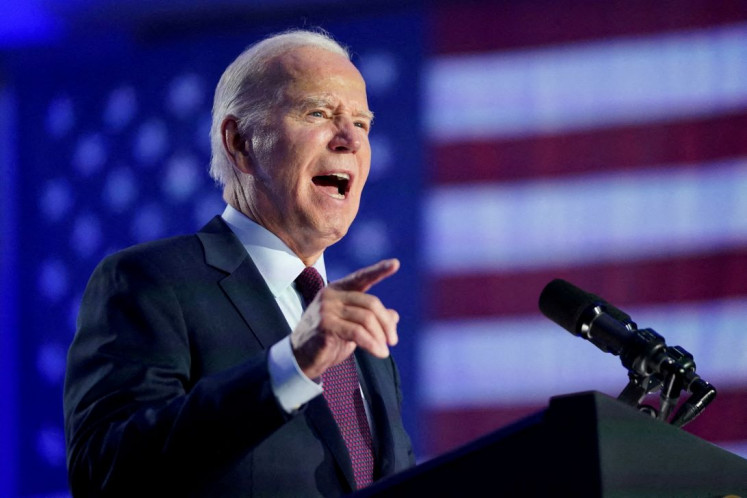From Rio to ‘Riau declaration’
Precisely a week after the end of the Rio+20 Earth Summit, the Indonesian Academy of Sciences (AIPI) initiated a national seminar titled “From Rio to Riau: Sustainable Development Based on Green Economy, Social and Culture”
Change Size

P
recisely a week after the end of the Rio+20 Earth Summit, the Indonesian Academy of Sciences (AIPI) initiated a national seminar titled “From Rio to Riau: Sustainable Development Based on Green Economy, Social and Culture”.
The seminar, held in Pekanbaru in cooperation with the Riau provincial government, resulted in the “Riau Declaration”. The declaration is in the form of a contextual commitment and action plan, because the Rio+20 produced did not touch the interests of the poor and developing countries such as Indonesia.
Although UN Secretary-General Ban Ki-moon deemed the conference, which involved about 45,000 people and leaders from 190 countries, a success, many, particularly environmentalists, considered it
a failure.
Kumi Naidoo, the executive director of Greenpeace International, called the 53-page final report of the conference that was titled “The Future We Want” as “the longest suicide note in history”.
Richard Dennis of the Australia Institute has even referred it as “Summit Cemetery”.
Developed countries dominated the conference and shamelessly promoted the interests of major corporations, rather than the interests of the people of poor nations and the fate of planet Earth. They tend to privatize the natural resources while spreading poverty of the people of developing nations.
Whenever the developing countries proposed for the provision of funds to support the pro-environment activities for sustainable development, the developed countries pretended to hear nothing. Apparently they do not want to be bound by commitments, especially in relation to funding.
One must admit that subsequent to the first Earth Summit, which was also initiated by the UN back in 1992, concerns about environmental issues and poverty were increasing and there were tangible results.
For example, Brazil retained 78 percent of its tropical forests. The poverty rate in the world decreased from 46 percent in 1992 to 27 percent this year. Life expectancy rates surged by an average of 3.5 years.
However, one cannot deny the fact that the world’s biodiversity has declined by 12 percent, 85 percent of marine fish stocks have been over-exploited and 740 million hectares of forest land have been cleared.
The Riau Declaration specifically mentions the importance of wisdom and justice in managing natural resources. Customary law, existence of communal land, provisions regarding forest prohibition and local knowledge should be the basis of development.
I remember a dissertation on legal studies under the guidance of the late Prof. Satjipto Rahardjo that found that one of the factors that caused environmental damage was the neglect of customary law in various areas.
The cover story of Papuans in Kompas on July 1 titled “Earth is Mother” is one example.
I also remember writing an article about the ecological balance, referring to the maxim of Papua that says the forest is a mother. It implies that destruction of forests in Papua is clearly not perpetrated by the Papuans.
There is a similar occurrence in Riau. A culturalist from Riau essentially suggested to maintain and preserve the forests, we must ban the cutting of trees and have an obligation to plant various plants.
In his paper, Ashaludin Jalil, the rector of the University of Riau, wrote: “The harmony of traditional communities’ lives and peaceful nature begin to be disturbed and torn apart whenever the capital owners arrive. They exploit nature with no courtesy or permission, and do not even care about the preservation of the indigenous communities who possess the traditions of natural resources conservation.”
Within the points included in the Riau Declaration is a statement on the strategic role of scientists and researchers in the development of Riau province and its abundant natural resources.
When Rio+20 only briefly mentioned the efforts to incorporate science into policy, the Riau Declaration explicitly highlighted a commitment and an action plan through science and technology with the active participation of the scientists, who mingle with indigenous peoples, entrepreneurs and all stakeholders.
Scientists and researchers from the public and private universities should not be carried away by ambition to be included in the category of world-class universities. Ambition is acceptable, but in my opinion, no less important is how the universities can produce graduates who are capable to manage the republic’s natural resources better.
Many studies must be carried out, but they should not stop at mere studies. The idea is “research for research’s sake”.
Each study should be followed by the development and utilization in real life. The campus scientists must counteract the allegations that R & D in Indonesia does not mean Research & Development, but Rust & Dust. There are even people who interpret it as Real & Dumb.
The contextual research studies from different regions to obtain new findings, new theories and knowledge derived from our own earth are urgently required.
Fresh ideas that have sprung up such as eco-socialism or commonism should be used as points for discussion and review of input for policymakers at the central and regional levels, in order to be implemented.
Hopefully the initiative that came from Riau will evolve and resonate at the national and global scale, to fine-tune the results of the Rio+20, whose report title is sometimes twisted into “The Future We Don’t Want”.
The writer is a member of the Indonesian Academy of Sciences (AIPI) and an author of the Riau Declaration.









